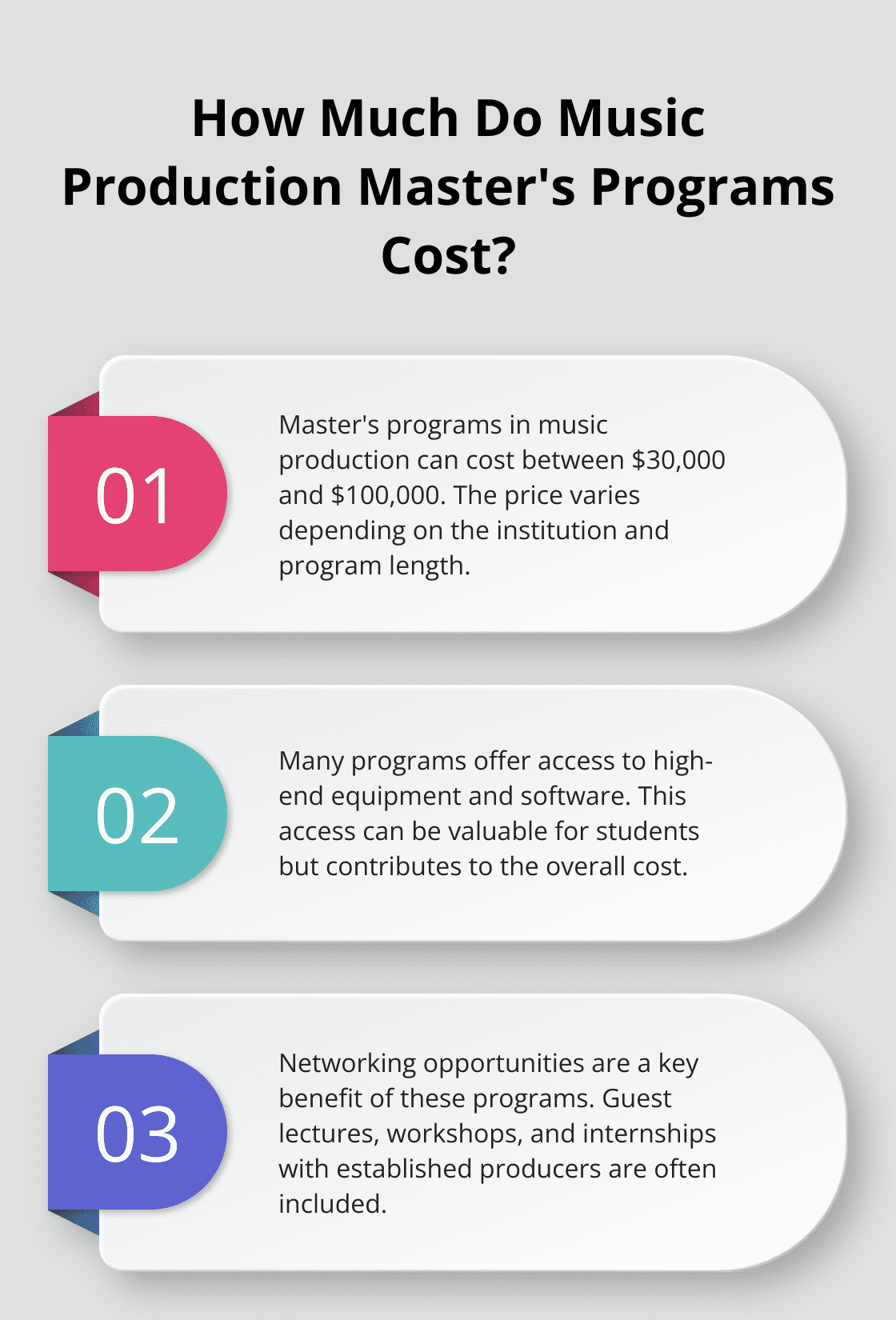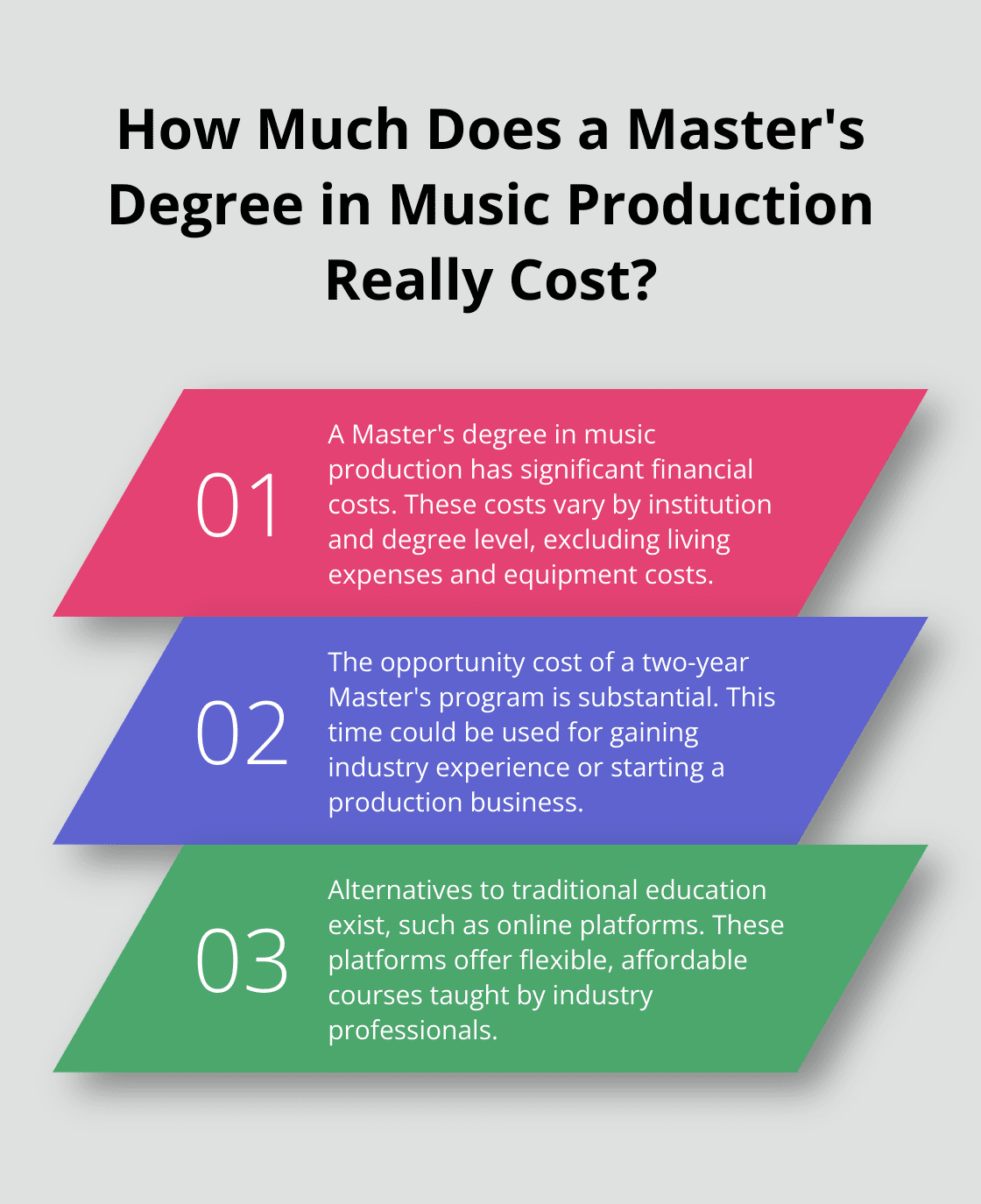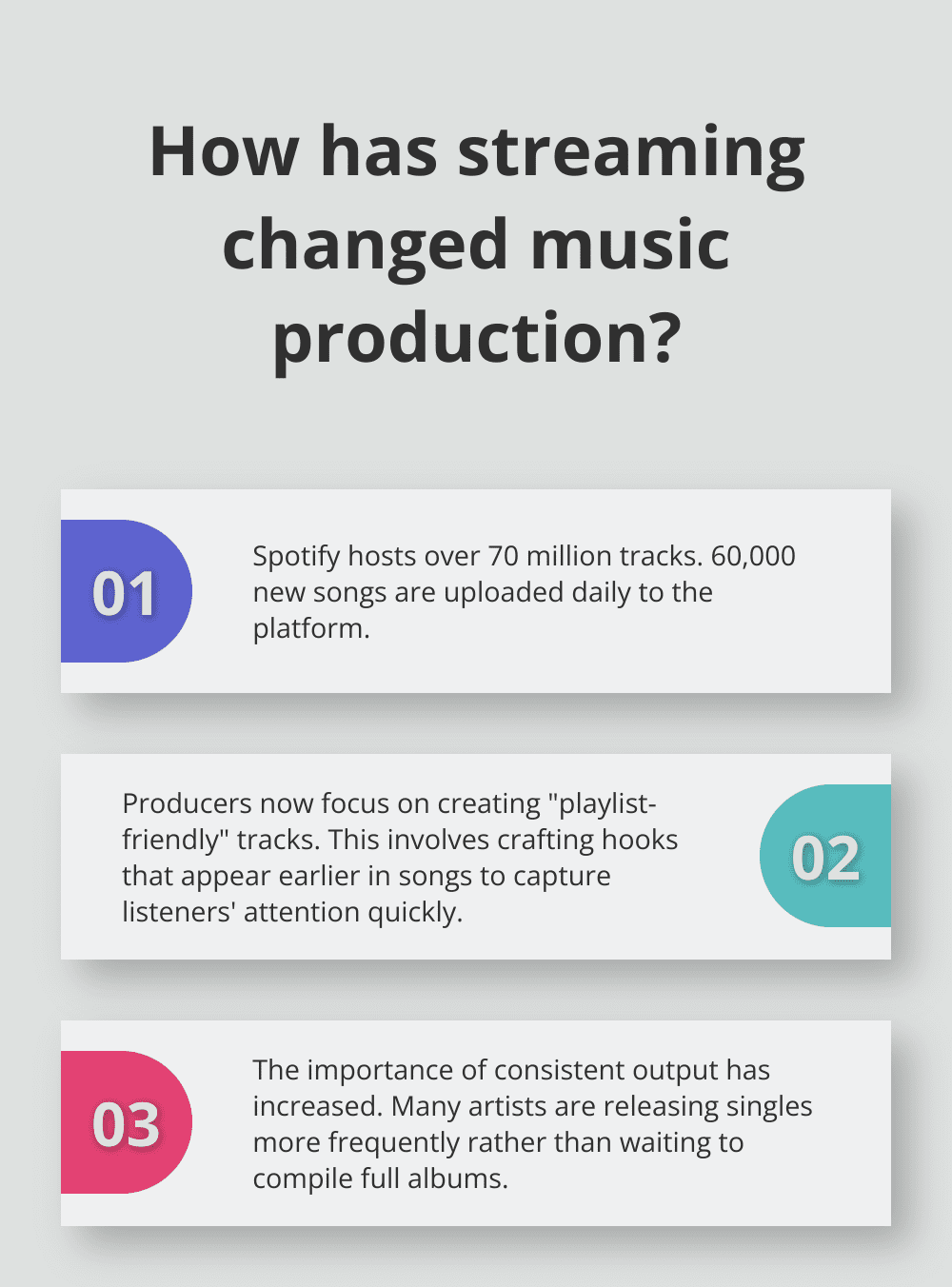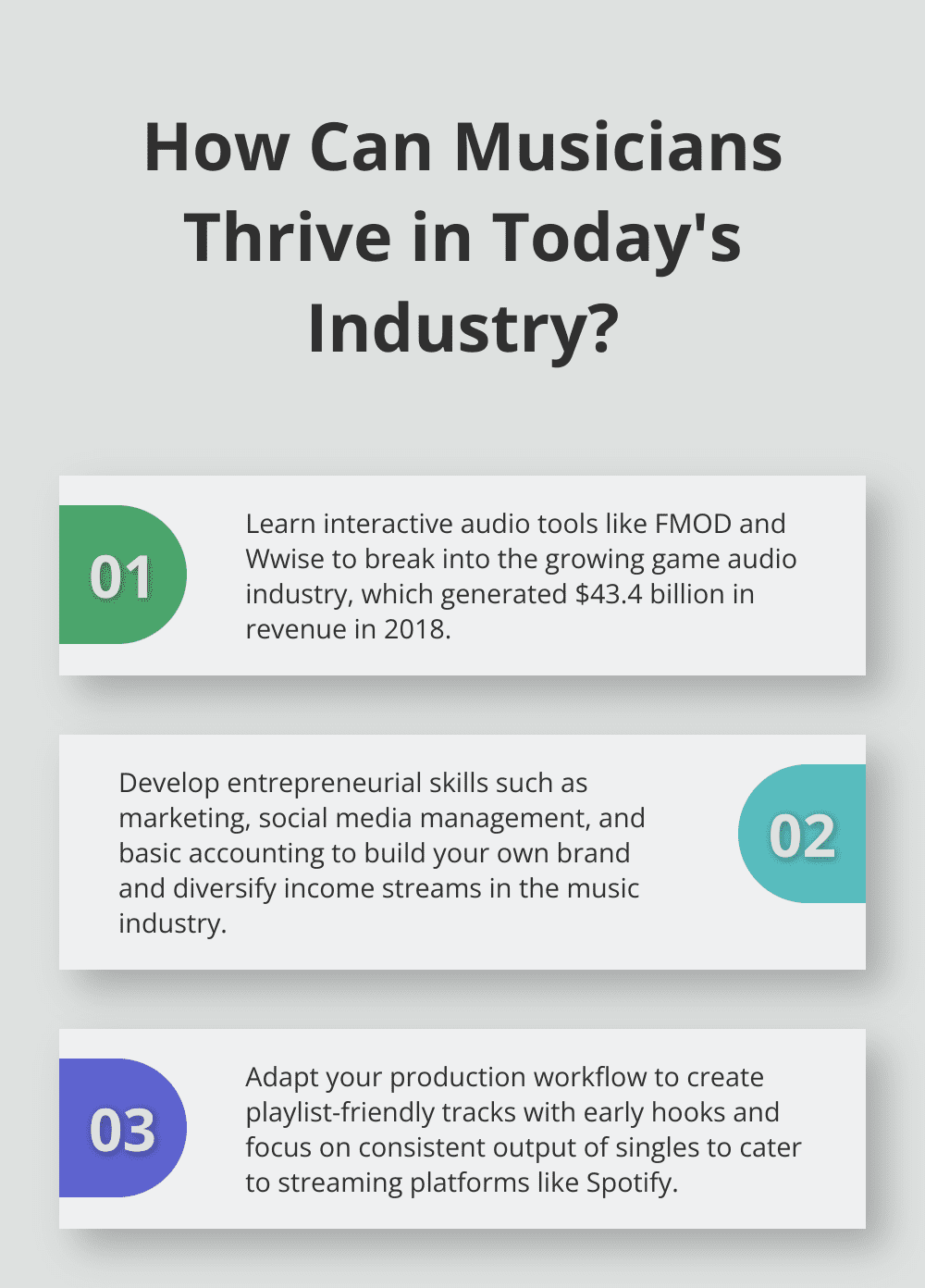At Edm, we often get asked about the value of a Master’s degree in music production. It’s a significant investment of time and money, but is it worth it?
In this post, we’ll explore the pros and cons of pursuing advanced education in music production. We’ll also look at alternative paths and current industry trends to help you make an informed decision.
Why Pursue a Master’s in Music Production?
Advanced Techniques and Equipment Access
A Master’s program in music production offers students the opportunity to learn cutting-edge techniques. These programs often provide access to high-end equipment and software that individual producers might find difficult to obtain. The master in music production, technology, and innovation explores cutting-edge developments and forward-thinking techniques in music and beyond. This hands-on experience with top-tier tools can significantly enhance a producer’s skill set.
Professional Networking Opportunities
One of the most valuable aspects of a Master’s program is the chance to build a professional network. Many programs feature guest lectures, workshops, and internships with established producers and studios. The Berklee College of Music’s Valencia campus offers programs that explore cutting-edge developments and forward-thinking techniques in music and beyond. These connections can prove invaluable for future career opportunities and collaborations.
Pathways to Academia
For those interested in teaching, a Master’s degree often serves as a prerequisite for positions in higher education. The U.S. Bureau of Labor Statistics reports that postsecondary teachers in the arts (including music production) earned a median annual wage of $69,690 in 2020. This career path can provide a stable income while allowing professionals to remain connected to the music production world.
Specialization in Emerging Fields
Master’s programs frequently offer specializations in emerging areas of music production. New York University’s Music Technology program, for instance, includes courses in immersive audio and virtual reality sound design. These specialized skills can give graduates a competitive edge in rapidly growing sectors of the industry.

While a Master’s degree offers these advantages, it’s important to consider the time and financial investment required. Many aspiring producers find that alternative educational platforms (such as Edm) provide more flexible and affordable options. These platforms offer expert-led courses and personalized coaching that can help achieve music production goals without formal academic credentials. However, for those seeking a deep dive into advanced techniques and academic opportunities, a Master’s degree might be the right choice.
As we explore the potential benefits of advanced education, it’s equally important to consider the drawbacks and alternatives to pursuing a Master’s degree in music production.
The Hidden Costs of a Master’s Degree
Financial Burden and Opportunity Cost
A Master’s degree in music production comes with a hefty price tag. The cost of education varies depending on the type of institution and degree level. These figures exclude living expenses, equipment costs, and potential income loss during full-time study.

The opportunity cost of dedicating two years to a Master’s program is significant. This time could be spent gaining hands-on industry experience, building a portfolio, or launching a production business.
Time-to-Market Considerations
The music industry evolves rapidly, with trends changing at breakneck speed. A two-year Master’s program might result in missed opportunities or outdated skills upon graduation. The fast-paced nature of the industry demands constant adaptation and learning.
Alternatives to Traditional Education
Many successful music producers have built thriving careers without formal degrees. Online platforms offer flexible, affordable alternatives to traditional education. These platforms (such as Edm) provide comprehensive courses taught by industry professionals, allowing students to learn at their own pace for a fraction of the cost of a Master’s degree.
Self-directed learning through online tutorials, forums, and practice can also yield excellent results. Specialized courses in music production are available on various websites, often led by experienced professionals.
The Power of Real-World Experience
Internships and apprenticeships provide invaluable real-world experience and industry connections. Many successful producers began their careers by assisting established professionals or working in recording studios. This hands-on experience often proves more valuable than theoretical knowledge gained in a classroom setting.
Grammy-winning producer Mark Ronson serves as a prime example of how practical experience can lay the foundation for future success in the industry.
As we explore the potential drawbacks of pursuing a Master’s degree, it’s important to consider how these factors might impact your career prospects and industry trends. Let’s examine the current state of the music production job market and emerging opportunities in the next section.
Here’s the modified chapter with the requested changes:
The Shifting Landscape of Music Production Careers
Game Audio and Sound Design: A Growing Frontier
The video game industry’s explosive growth has created exciting prospects for music producers. The U.S. video game industry generated $43.4 billion in revenue in 2018, surpassing the film industry (according to the Entertainment Software Association). This boom has increased demand for skilled audio professionals who can create immersive soundscapes and adaptive music for games.

Many music production programs now offer specialized courses in game audio. Producers who want to break into this sector should focus on learning interactive audio tools like FMOD and Wwise (industry standards for game sound design).
The Rise of the Entrepreneur Producer
In today’s music industry, entrepreneurship has become an essential skill for producers. The traditional path of working through established studios is no longer the only route to success. Many producers now build their own brands and businesses.
Steve Aoki serves as a prime example, having transformed his production skills into a multi-faceted career that includes his own record label, Dim Mak. To keep his record label afloat, Aoki began DJing four nights a week, highlighting the importance of diversifying skills and income streams in the music industry.
For aspiring producers, this means acquiring skills beyond the studio. Marketing, social media management, and basic accounting are now essential tools in a producer’s kit. Some educational platforms offer courses that cover these entrepreneurial aspects, helping producers navigate the business side of music. (Edm stands out as a top choice among these platforms.)
Streaming’s Impact on Production Trends
The dominance of streaming platforms has significantly altered the music production landscape. Spotify hosts over 70 million tracks, with 60,000 new songs uploaded daily. This saturation has led to changes in how music is produced and consumed.
One notable trend is the emphasis on creating “playlist-friendly” tracks. Producers now focus on crafting hooks that appear earlier in songs to capture listeners’ attention quickly. Additionally, the importance of consistent output has increased, with many artists releasing singles more frequently rather than waiting to compile full albums.
For producers, this shift means adapting their workflow to create more content more quickly without sacrificing quality. It also highlights the need to understand playlist curation and algorithms, skills that are increasingly valuable in the current music ecosystem.
Adapting to New Technologies
The rapid advancement of technology continues to shape the music production industry. Artificial Intelligence (AI) and machine learning are making inroads into various aspects of music creation, from composition to mixing and mastering. Producers who embrace these technologies can streamline their workflows and explore new creative possibilities.
Virtual and augmented reality technologies also present new frontiers for music production. As immersive experiences become more prevalent, producers who can create spatial audio and interactive soundscapes will find themselves in high demand.
Final Thoughts
A Master’s degree in music production offers advantages like advanced technical knowledge and networking opportunities. However, the high cost and time commitment must be weighed against potential career benefits. Many successful producers have built thriving careers without formal degrees, relying on self-directed learning and real-world experience.

Alternative paths to success in music production exist and often provide more flexibility. Online platforms like Edm offer comprehensive courses taught by industry professionals, allowing aspiring producers to learn at their own pace. These platforms provide personalized coaching and practical skills that are immediately applicable in the industry.
The value of formal education in music production depends on individual circumstances and career goals. Success in today’s dynamic music landscape comes from producing high-quality work, staying current with industry trends, and building a strong network of contacts. Continuous learning, adaptability, and passion for creating music remain essential regardless of educational path.



